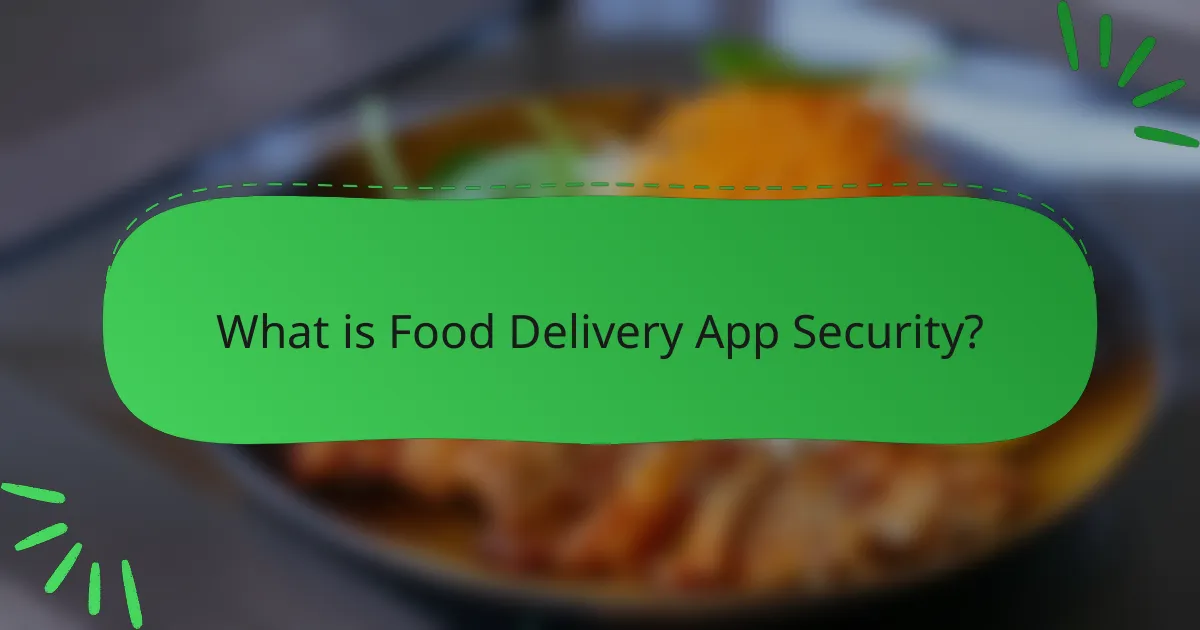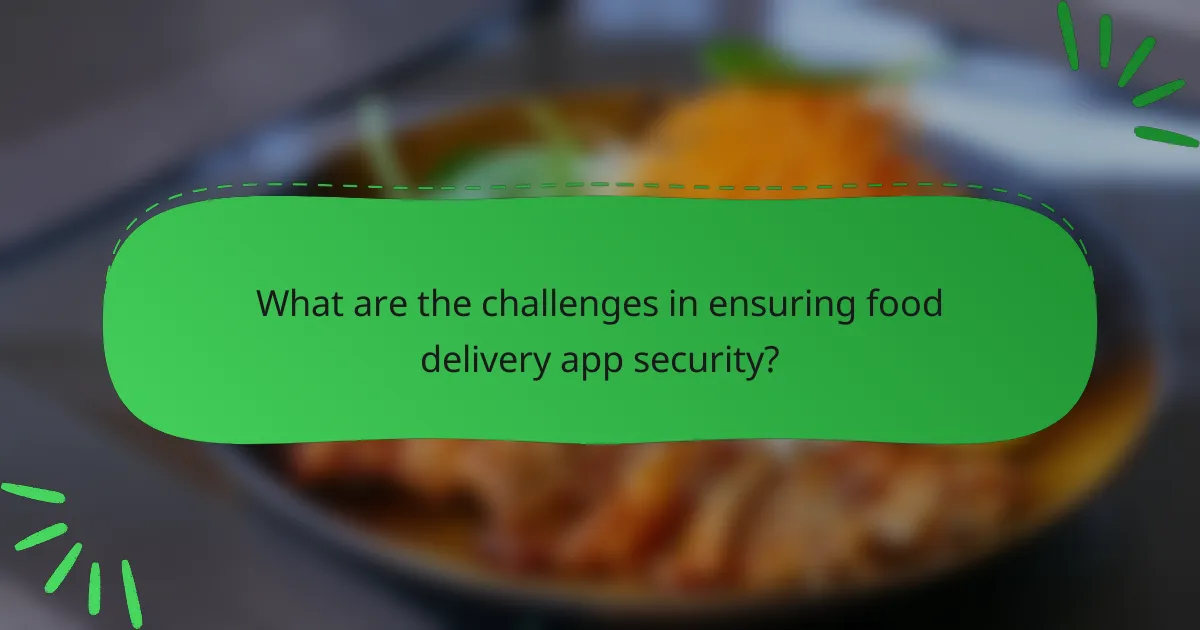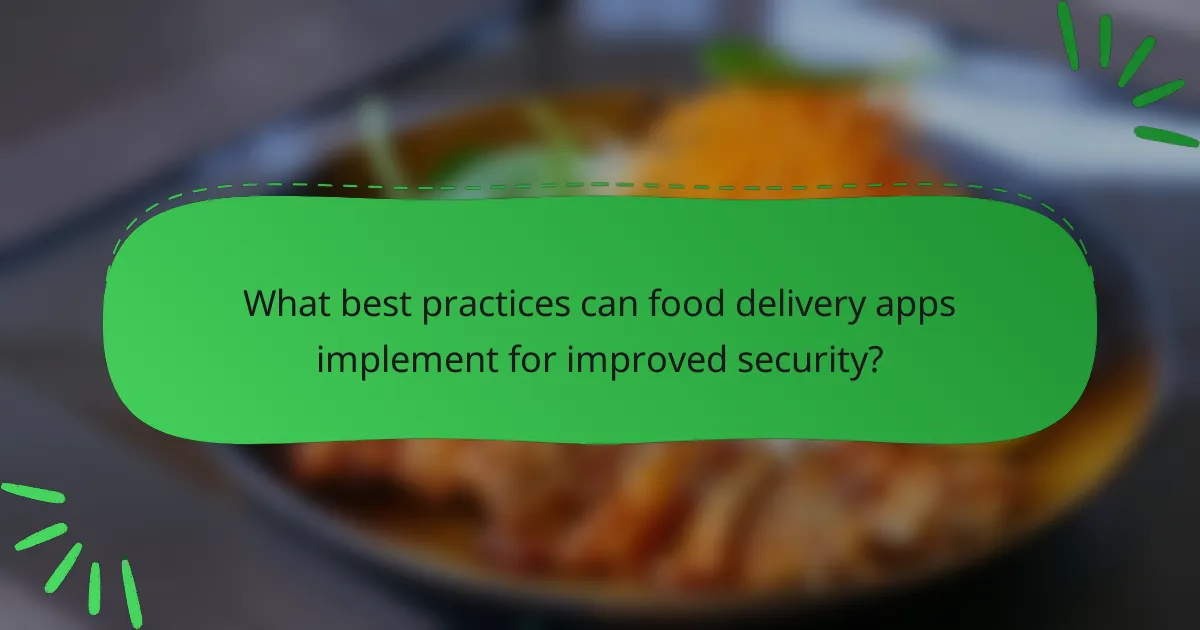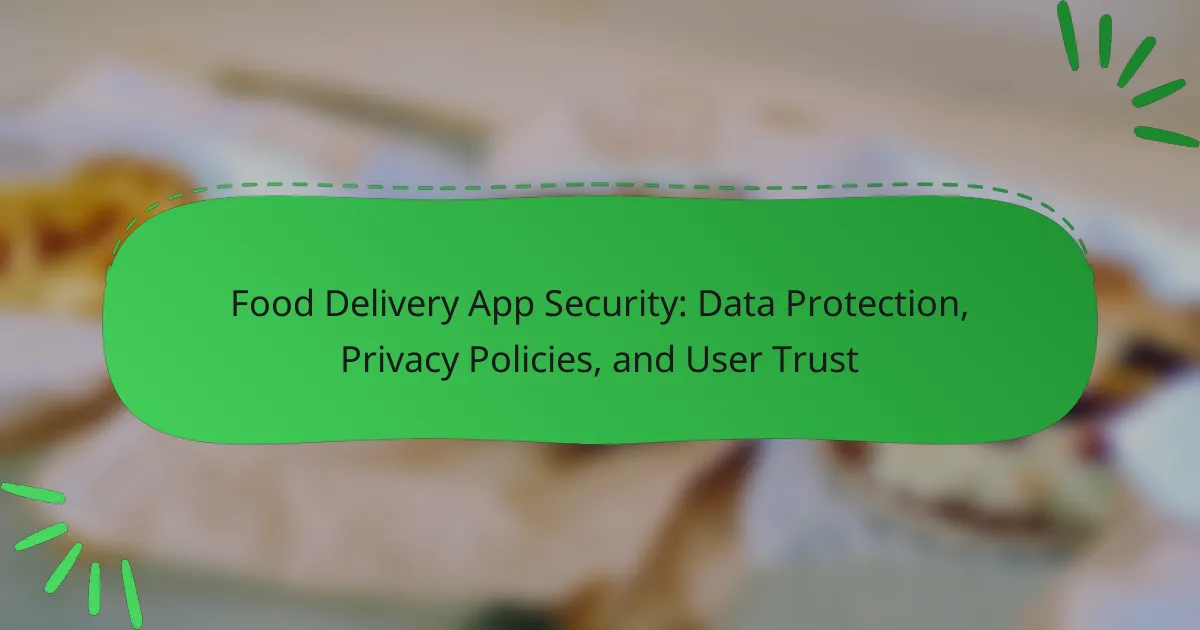Food delivery app security encompasses the measures and protocols aimed at protecting sensitive data, including personal information, payment details, and order history, from unauthorized access and cyber threats. This article outlines the significance of robust security practices such as encryption, secure payment gateways, and adherence to data protection regulations like the General Data Protection Regulation (GDPR). It addresses the challenges faced by food delivery apps, including the rise in cyberattacks, the complexity of compliance with varying regulations, and the necessity of user awareness. Furthermore, best practices for enhancing security, such as end-to-end encryption, regular security audits, two-factor authentication, and user education, are discussed to build trust and safeguard user data effectively.

What is Food Delivery App Security?
Food delivery app security refers to the measures and protocols designed to protect sensitive data within food delivery applications. This includes safeguarding personal information, payment details, and order history from unauthorized access and cyber threats. Effective security practices involve encryption, secure payment gateways, and compliance with data protection regulations. For example, the General Data Protection Regulation (GDPR) mandates strict guidelines for handling personal data in the European Union. Additionally, a study by Cybersecurity Ventures projects that cybercrime will cost the world $10.5 trillion annually by 2025, highlighting the critical need for robust security in digital platforms, including food delivery apps.
How do food delivery apps ensure data protection?
Food delivery apps ensure data protection through encryption, secure payment processing, and compliance with data protection regulations. They use encryption protocols like SSL to protect user data during transmission. Secure payment gateways ensure that financial information is not stored on their servers. Many apps comply with regulations such as GDPR or CCPA, which mandate strict data handling practices. Regular security audits are conducted to identify and address vulnerabilities. User data is often anonymized to further enhance privacy. These measures collectively help build user trust in food delivery services.
What encryption methods are commonly used in food delivery apps?
Common encryption methods used in food delivery apps include SSL/TLS encryption and end-to-end encryption. SSL (Secure Sockets Layer) and TLS (Transport Layer Security) encrypt data transmitted between the user’s device and the app’s server. This ensures that sensitive information, like payment details, is secure during transmission. End-to-end encryption protects data from the point of origin to the final destination. It prevents unauthorized access during the entire data transfer process. These methods are widely adopted to enhance user trust and ensure compliance with data protection regulations.
How do food delivery apps protect user payment information?
Food delivery apps protect user payment information through encryption and secure payment gateways. They employ end-to-end encryption to safeguard data during transmission. This means that payment details are scrambled, making them unreadable to unauthorized parties. Additionally, many apps utilize tokenization, which replaces sensitive information with unique identifiers. This process further reduces the risk of data breaches. Compliance with Payment Card Industry Data Security Standards (PCI DSS) is also a common practice. This compliance ensures that apps meet stringent security requirements for handling payment information. Regular security audits and updates help maintain these protective measures. These protocols collectively enhance user trust and protect against fraud.
Why are privacy policies important for food delivery apps?
Privacy policies are important for food delivery apps because they inform users about data collection and usage. These policies clarify how personal information is handled, ensuring transparency. Users need to understand what data is collected, such as location and payment details. Clear privacy policies build user trust, which is crucial for customer retention. According to a 2021 survey by the Pew Research Center, 79% of Americans are concerned about how their data is used. Compliance with regulations, like GDPR, is also essential for legal protection. Without a privacy policy, apps risk losing users and facing legal consequences.
What key elements should be included in a food delivery app’s privacy policy?
A food delivery app’s privacy policy should include key elements such as data collection, usage, and sharing practices. It must specify what personal information is collected from users, such as names, addresses, and payment details. The policy should explain how this information is used, including for order processing and customer service. It should also detail how user data is shared with third parties, such as delivery partners or payment processors. Additionally, the policy must outline data retention practices, indicating how long user data is stored. Users should be informed about their rights regarding data access and deletion. Security measures to protect user data must be clearly stated. Finally, the policy should include contact information for privacy inquiries or complaints.
How do privacy policies vary between different food delivery apps?
Privacy policies vary significantly between different food delivery apps. Each app has its own approach to data collection, usage, and sharing. For instance, some apps may collect detailed location data while others may only require a general address. Additionally, the duration for which data is retained can differ; some apps may store user data indefinitely, while others may have specific time limits.
Moreover, transparency levels vary; some apps clearly outline their data practices, while others may use complex language that obscures their policies. User consent mechanisms also differ; some apps require explicit consent for data sharing, while others may assume consent through usage.
A notable example is how app policies address third-party sharing. Some apps may share data with marketing partners, while others limit sharing to essential service providers only. Furthermore, user rights regarding data access and deletion can vary. Some apps provide straightforward processes for users to manage their data, while others may have cumbersome procedures.
These differences highlight the need for users to review privacy policies carefully before using food delivery services.
How does user trust impact food delivery app security?
User trust significantly impacts food delivery app security by influencing user engagement and data sharing. When users trust an app, they are more likely to share personal information and payment details. This trust encourages users to interact more frequently with the app. High user trust leads to increased data volume, which necessitates stronger security measures to protect that data. Conversely, if users feel insecure, they may limit their use of the app or provide false information. Research indicates that 85% of users are concerned about their data security in food delivery apps. This concern can lead to decreased user retention and engagement if not addressed. Therefore, maintaining user trust is essential for ensuring robust security protocols within food delivery applications.
What factors contribute to building trust among users of food delivery apps?
User trust in food delivery apps is influenced by several key factors. These factors include data security, transparency in operations, and reliable customer service. Data security involves protecting user information from breaches. Apps that employ encryption and secure payment methods enhance user confidence. Transparency refers to clear communication about delivery times and fees. Users appreciate knowing what to expect during the delivery process. Reliable customer service builds trust by addressing user concerns promptly. According to a survey by Statista, 85% of users prioritize security in food delivery apps. This statistic underscores the importance of these factors in fostering user trust.
How can food delivery apps enhance user trust through transparency?
Food delivery apps can enhance user trust through transparency by clearly communicating their data practices. Users appreciate knowing how their personal information is collected, used, and protected. Providing detailed privacy policies fosters a sense of security. Regular updates about changes in data handling also build confidence. Additionally, sharing real-time order tracking information increases transparency. Users feel more in control when they can monitor their orders. Transparency in pricing and fees further enhances trust. Clear explanations of charges prevent misunderstandings. Overall, these practices create a trustworthy environment for users.

What are the challenges in ensuring food delivery app security?
Ensuring food delivery app security faces multiple challenges. One major challenge is protecting sensitive user data. This includes personal information and payment details. Cyberattacks targeting these apps have increased. A report from Cybersecurity Ventures predicts that cybercrime will cost the world $10.5 trillion annually by 2025. Another challenge is securing communication channels. Insecure APIs can expose data to unauthorized access. Additionally, ensuring compliance with regulations like GDPR adds complexity. Apps must navigate different laws across regions. User awareness also poses a challenge. Many users lack knowledge about privacy settings and security features. This can lead to unintentional data sharing. Finally, maintaining trust is crucial. High-profile security breaches can damage user confidence. Restoring trust after a breach requires significant effort. These challenges highlight the need for robust security measures in food delivery apps.
What are the common security threats faced by food delivery apps?
Common security threats faced by food delivery apps include data breaches, payment fraud, and account hacking. Data breaches can expose sensitive user information. According to a 2021 report by IBM, the average cost of a data breach is $4.24 million. Payment fraud occurs when unauthorized transactions are made using stolen payment information. A study by Javelin Strategy & Research found that $16 billion was lost to payment fraud in 2020. Account hacking involves unauthorized access to user accounts, often through phishing attacks. The FBI reported that phishing attacks increased by 400% during the COVID-19 pandemic. These threats compromise user trust and can lead to significant financial losses for both users and companies.
How do data breaches affect food delivery app users?
Data breaches negatively impact food delivery app users by compromising their personal information. Users may experience identity theft if sensitive data, such as credit card details or addresses, is exposed. A study by the Identity Theft Resource Center found that over 1,000 data breaches were reported in 2020, affecting millions of individuals. Users may also face financial losses due to unauthorized transactions following a breach. Trust in the food delivery service can diminish, leading to decreased app usage. Moreover, users often incur costs related to monitoring their credit and protecting their identities after a breach. These factors collectively highlight the significant risks data breaches pose to food delivery app users.
What measures can be taken to prevent hacking in food delivery apps?
Implementing strong security measures is essential to prevent hacking in food delivery apps. Regularly updating software and systems can close vulnerabilities. Utilizing encryption for user data protects sensitive information during transmission. Multi-factor authentication adds an extra layer of security for user accounts. Conducting regular security audits helps identify potential weaknesses. Educating users about phishing and other scams can reduce risks. Monitoring app activity for unusual behavior can detect hacking attempts early. Collaborating with cybersecurity experts enhances overall security measures. According to a report by Cybersecurity Ventures, cybercrime is expected to cost the world $10.5 trillion annually by 2025, highlighting the importance of robust security in apps.
How do regulatory requirements influence food delivery app security?
Regulatory requirements significantly influence food delivery app security by mandating specific data protection measures. These regulations, such as the General Data Protection Regulation (GDPR) in Europe, require companies to implement robust security protocols. Compliance necessitates encryption of user data and secure payment processing to prevent breaches.
Additionally, regulations often require transparency in data handling practices. This includes informing users about data collection and usage, which builds trust. Non-compliance can result in severe penalties, incentivizing companies to prioritize security.
Moreover, regulatory frameworks often dictate the need for regular security audits and assessments. These assessments help identify vulnerabilities in the app’s infrastructure. Overall, regulatory requirements create a structured approach to enhancing food delivery app security.
What regulations must food delivery apps comply with regarding data protection?
Food delivery apps must comply with data protection regulations such as the General Data Protection Regulation (GDPR) in Europe and the California Consumer Privacy Act (CCPA) in the United States. GDPR requires apps to obtain user consent for data collection and to provide transparency about data usage. It mandates that users have the right to access, rectify, and delete their personal data. CCPA grants California residents similar rights, including the ability to opt-out of data selling. Additionally, food delivery apps must ensure data security measures are in place to protect user information from breaches. Non-compliance can result in significant fines and legal repercussions.
How does compliance with regulations enhance user trust?
Compliance with regulations enhances user trust by demonstrating a commitment to safety and ethical standards. When food delivery apps adhere to regulations, they show users that they prioritize data protection and privacy. This compliance reduces the risk of data breaches and misuse of personal information. Trustworthy practices lead to higher user retention rates. According to a study by the Ponemon Institute, companies that comply with data protection regulations experience 30% fewer data breaches. Such statistics reinforce user confidence in the app’s security measures. Overall, regulatory compliance fosters a transparent relationship between users and service providers.

What best practices can food delivery apps implement for improved security?
Food delivery apps can implement several best practices for improved security. First, they should use end-to-end encryption for user data. This protects sensitive information during transmission. Second, regular security audits are essential. These audits identify vulnerabilities and help mitigate risks. Third, implementing two-factor authentication enhances account security. This adds an extra layer of protection against unauthorized access.
Additionally, food delivery apps should ensure compliance with data protection regulations. This includes GDPR and CCPA, which safeguard user privacy. Regular software updates are also crucial. They address security flaws and enhance app performance. Lastly, educating users about safe practices is important. Users should be informed about recognizing phishing attempts and using strong passwords.
These practices collectively strengthen the security framework of food delivery apps. They help build user trust and protect sensitive information from potential threats.
How can food delivery apps educate users about data protection?
Food delivery apps can educate users about data protection through clear communication of privacy policies. They should provide easily accessible information on how user data is collected, stored, and used. Regular updates on data protection practices can enhance user awareness. Interactive tutorials or pop-up notifications can explain security features and best practices. Additionally, apps can offer FAQs addressing common data protection concerns. User engagement through surveys can also help gather feedback on data protection understanding. Transparency about data breaches and response protocols builds trust. According to a 2022 survey by the Pew Research Center, 79% of users are concerned about how their data is used.
What tips can users follow to protect their data while using food delivery apps?
Users can protect their data while using food delivery apps by following several key tips. First, they should use strong, unique passwords for their accounts. This reduces the risk of unauthorized access. Second, enabling two-factor authentication adds an extra layer of security. Third, users should regularly update their apps to patch security vulnerabilities. Fourth, they should avoid using public Wi-Fi for transactions. Public networks are often insecure and can expose personal information. Fifth, users should review the app’s privacy policy to understand how their data is used. Sixth, they should limit the personal information shared within the app. Finally, monitoring bank statements for unauthorized charges can help detect potential fraud early. These practices significantly enhance data protection while using food delivery services.
What technological advancements are shaping food delivery app security?
Technological advancements shaping food delivery app security include end-to-end encryption, biometric authentication, and blockchain technology. End-to-end encryption protects user data by ensuring that only the sender and recipient can access the information. Biometric authentication, such as fingerprint or [censured] recognition, enhances security by verifying user identity. Blockchain technology offers a decentralized and tamper-proof ledger for transactions, increasing transparency and trust. According to a 2021 report by Cybersecurity Ventures, the global cybersecurity market is expected to reach $345.4 billion by 2026, indicating a growing focus on security solutions. These advancements collectively enhance the protection of sensitive user data and foster user trust in food delivery services.
How can artificial intelligence improve security measures in food delivery apps?
Artificial intelligence can improve security measures in food delivery apps by enhancing fraud detection and user authentication. AI algorithms analyze transaction patterns to identify anomalies that may indicate fraudulent activity. This proactive detection can reduce losses for both the platform and users. Additionally, AI can strengthen user authentication processes through biometric verification, such as [censured] recognition or fingerprint scanning.
These methods increase security by ensuring that only authorized users access their accounts. According to a report by McKinsey, AI-driven security measures can decrease fraud rates by up to 30%. Machine learning models continuously adapt to new threats, making them more effective over time. AI can also automate the monitoring of user data for compliance with privacy regulations, ensuring that apps maintain user trust.
What role does blockchain technology play in enhancing data security?
Blockchain technology enhances data security by providing a decentralized and immutable ledger. This means that once data is recorded on the blockchain, it cannot be altered or deleted. Each transaction is encrypted and linked to the previous one, creating a secure chain of information. This structure makes it extremely difficult for unauthorized users to tamper with data. Furthermore, blockchain employs consensus mechanisms to validate transactions, ensuring that all parties agree on the data’s accuracy. According to a study published in the Journal of Cybersecurity, blockchain can reduce data breaches by up to 80%. This significant reduction underscores its effectiveness in protecting sensitive information.
What are the future trends in food delivery app security?
Future trends in food delivery app security include enhanced encryption methods and biometric authentication. These advancements aim to protect user data from breaches. Machine learning algorithms will be employed to detect and prevent fraudulent activities in real time. Additionally, stricter compliance with data protection regulations is expected. This includes adherence to GDPR and CCPA guidelines. Companies will increasingly focus on transparent privacy policies to build user trust. Regular security audits and vulnerability assessments will become standard practice. Finally, user education on security best practices will be prioritized to mitigate risks.
How will emerging technologies impact user trust in food delivery apps?
Emerging technologies will enhance user trust in food delivery apps by improving security and transparency. Technologies like blockchain can provide verifiable transaction records. This ensures users that their data and payment information are secure. AI can personalize user experiences while safeguarding privacy. Enhanced encryption methods will protect sensitive information from breaches. A survey by Statista indicates that 70% of users prioritize data security in app usage. Trust increases when users feel their data is handled responsibly. Overall, these technologies foster a safer environment, encouraging more users to engage with food delivery services.
What proactive steps can food delivery apps take to stay ahead of security threats?
Food delivery apps can enhance security by implementing robust encryption protocols. This protects sensitive user data during transmission. Regularly updating software and security systems is crucial to address vulnerabilities. Conducting frequent security audits helps identify potential weaknesses. User education on safe practices can reduce risks of phishing attacks. Collaborating with cybersecurity firms can provide advanced threat detection solutions. Additionally, employing multi-factor authentication adds an extra layer of security for user accounts. These steps collectively strengthen the overall security framework of food delivery apps.
Food delivery app security encompasses the measures and protocols aimed at protecting sensitive data within food delivery applications, including personal information and payment details. The article covers various aspects of data protection, such as encryption methods, secure payment processing, and compliance with regulations like GDPR and CCPA. It highlights the importance of privacy policies in building user trust and outlines the challenges faced by these apps in ensuring security against threats like data breaches and payment fraud. Additionally, the role of emerging technologies and best practices for enhancing security and user education are discussed, emphasizing the need for robust measures to maintain user confidence in food delivery services.
